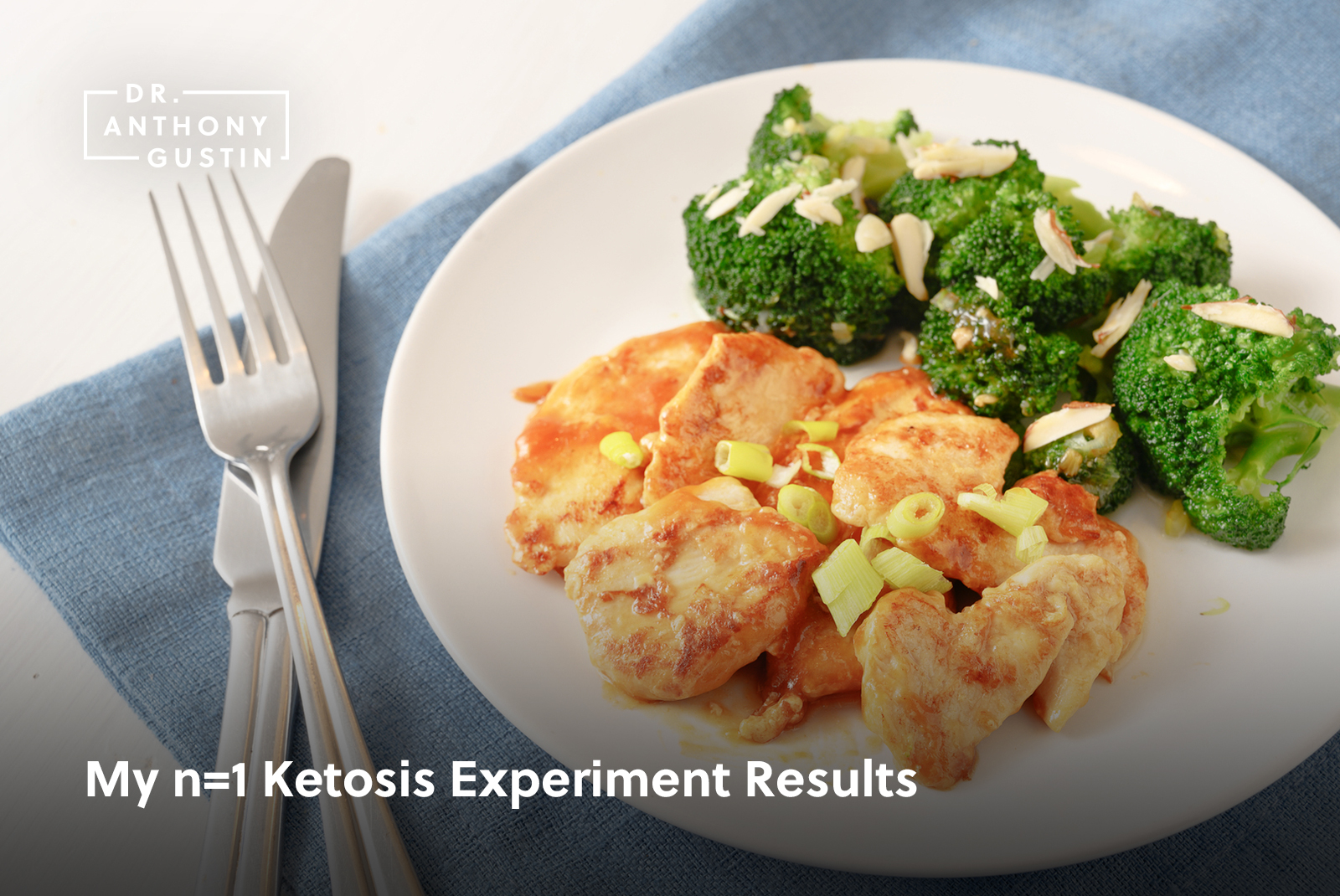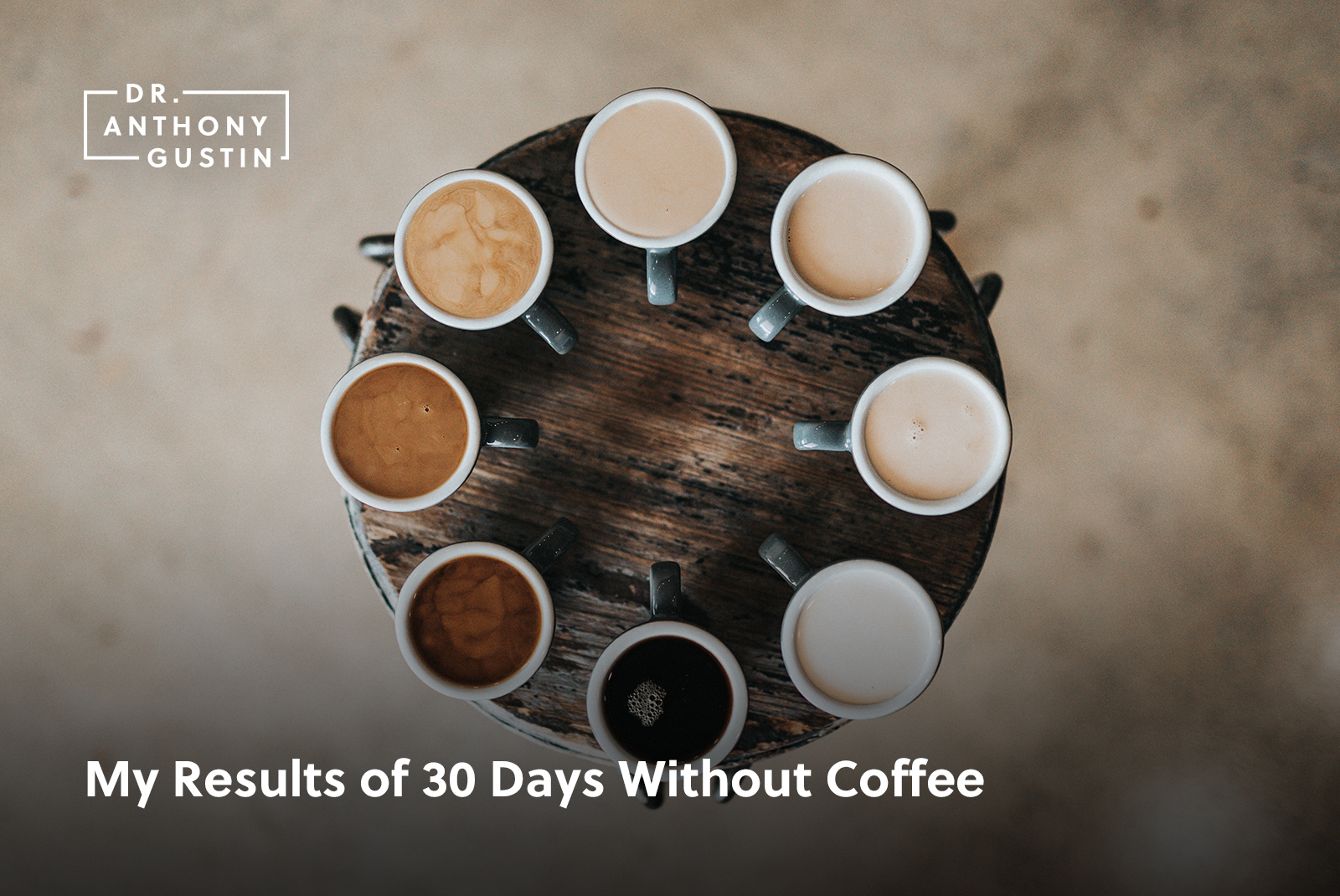My n=1 Ketosis Experiment Results

We’re nearing the end of the ketosis experiment I started two months ago, so it is time to recap the data and see where we’ve come. Before you piss your pants with excitement, I have some bad news for you.
Unfortunately, last week is the first time that I got a lot of the initial lab results back. Yes, it can take about 4-6 weeks to get some functional medicine lab tests back. The results were not what was I was expecting. The initial set of data has unfortunately been comprised. This means that most of the lab work will not be valid before and after. We’ll chat more on this soon.
As a refresher, the here are the labs and tests that I ran in week one to get a large picture of health to compare the before and after of my strict ketogenic experiment:
1) Traditional blood chemistry looking at inflammation, lipid panels, thyroid, liver, and others
2) Body Spec DEXA body scan for body composition changes
3) Doctors Data Stool Test for a large picture of gut health
4) Genova Organix Organic Acids Test for overview of metabolic processes
5) DUTCH Test for overview of adrenal/hormone function
6) uBiome test for gut population
7) Random subjective measures
Before we get into the results of the benchmark data and everything I’ve collected to this point, I should probably lay the bad news on you now. I mentioned briefly in my original post that I wanted to do some of these labs as a baseline to follow up on my recent workload and to review the impact of an illness I got when I was traveling abroad. This “illness” has completely screwed up the experiment data.
I’ll spare some of the gory details, but it’s worth explaining as a health example that some people can hopefully relate to and learn from.
On a cool evening in early January, wandering around the streets of Lisbon, Portugal, I stumbled upon a fantastic local restaurant. Being as this is usually how I get to know a new city, I gleefully took a seat inside. As the server explained their specials of the evening, she almost started crying tears of joy about how excited she was about a few different dishes, one of them being raw local mackerel. Now, Portugal is known for their wonderful seafood and you always go with the local delicacies, so raw mackerel it was.
About 45 minutes after this fishy treat, my health status took a turn for the worst. My little swimming buddies led me straight on a tour through the many fiery pits of hell. This trip included a severe fever, accompanied by vicious rejection of the food for several hours. One of the most intense symptoms was neurological in nature, involving confusion and muscle weakness. The weakness was so bad that for the following 2-3 weeks I was extremely fatigued and had to rest after walking even one to two city blocks. Not good.
Essentially what happened is a horde of tiny Portuguese demons entered my guts and my body didn’t like it. It responded the best it could, but it wasn’t enough.
This little demon clan is still inside my guts, wreaking havoc, even though I don’t have any apparent symptoms. I feel fine, but that’s the entire problem. As you’ll see with my labs, my insides are definitely not fine.
This can often happen with parasitic infections. They are horrible, then you feel fine. Meanwhile, they persist doing massive amounts of damage in the background.
Keep this story in mind as we walk through the results of this experiment. Just because you “feel fine” doesn’t mean that your body is operating at peak condition. There could be damaging processes going on behind the scenes without your knowledge.
This will be the first of many times that I will iterate this, but this is a prime example of why you should be testing yourself somewhat regularly to at least screen and get some benchmarks on your labs. Overt symptoms are not a reliable measure for your health status.
Below are the results of the data so far through about eight weeks of the ketosis experiment.
Lab Tests
These lab chemistry tests are what most people think of when they think of lab work. I went above and beyond on a couple measures, looking more in depth at the breakdown of the lipid panel, inflammation, and a few other markers. Basically the things I was curious if ketosis adn fasting would modify. Below is what stood out to me.

I had a little bit of a cold during the last measurement point, which spiked both inflammatory and lipid panel numbers slightly. I’m still fascinated with how much the numbers responded to fasting (third data point) and wonder if this is a trend that would continue with repeated fasting. Yes, I will end up testing fasting results multiple times in the future. Yes, I will post them so the three readers of this website (Hi, Mom!) can be bored for a solid fifteen minutes.
Not much changed with my lipid panel from the beginning. My LDL reading was a little higher, my hypothesis being that having a slight cold, which increases inflammatory responses, will increase LDL in response. Triglycerides were lower than at baseline, but not to a significant degree. It was nice to see the triglycerides fall back down after the fast.

This is something to note for people worried about eating too much fat. My triglycerides were 67 after eating almost all fat for eight weeks. When your doctor tells you to switch to a low-fat diet if your triglycerides are high, tell him he doesn’t understand the human body and that he should probably read a book. High-fat diets do not lead to high serum lipid profiles.
I wrote about this in my fasting results, but this is also a pretty normal lipid panel for me. I track my NMR lipid profile, looking at the density of my LDL and also Lp(a) and apolipoprotein B with great distribution and ratios. Before you tell me to go on a statin because of my LDL numbers, please do research on the previous sentence and realize I’m good to go.
Nothing of note changed anywhere else on my blood chemistry panel, including on my NMR lipid profile, Hba1(c), thyroid, liver, or chem panel.
As you will see further down the results page, this is why it is extremely important to take a look at more systems in your body other than your blood chemistry.
I do an overboard blood panel which measures about 100x more things than the average person gets. When your doctor orders a CBC, chem panel and lipid panel and checks you out as fine and dandy, seriously, tell them to go read a book.
Taking a look at blood chemistry is, well, just taking a look at your blood. Your body is made up of many other systems than what floats around in your bloodstream. Just by looking at my blood panel I would be confident that I’m a super healthy human. This is not the case as we’ll soon find out. And this would never be known without a more comprehensive look at the body’s other systems.
You MUST test more than just your blood chemistry to get a picture of your health, ESPECIALLY if you have any overt symptoms that you are trying to treat.
Bloodwork Moving Forward:
I’m usually a lunatic about doing pretty comprehensive blood work a few times a year, so not much will change as far as what I’m actually measuring. It would be interesting to track these numbers with ramping carbohydrates up. I’ve done this in the past and triglycerides and hsCRP have skyrocketed, with not much else changing.
DEXA Scan via Body Spec
A DEXA scan is basically a fancy x-ray that tells you exactly how much lean vs fat tissue you have in very specific parts of your body. This is superior to a dunk tank because you can see exactly where you’re gaining or losing fat vs. muscle. I had tons of questions after the last post about where I go for this. I use Body Spec in San Francisco.
Here are the results of my body composition from baseline through week six:

Start: 141.8 pounds lean body mass || 21.2 pounds fat mass || 6.8 pounds bone mass
End: 143.5 pounds lean body mass || 20.9 pounds fat mass || 6.8 pounds bone mass
Overall Change: +1.7 pounds lean body mass / -0.3 pounds fat mass
You can see in the graph above the change I had after my fast. If you want those results, check out my four-day fasting results post.
Nothing really changed here and probably just gained a few pounds from before after I was sick. This is pretty normal as I was usually undereating most days (fat is filling!). My workouts have been pretty mild for the duration of this experiment, with some of the most arduous exercise being delivered via way of intensely heated table tennis matches.
For me, I can pretty conclusively say that ketosis doesn’t waste my tissues away, but it also doesn’t effortlessly make me superhuman shredded. I’m already reasonably lean and would probably have to do a little more tweaking with consistently lowering of calories to get to that point. Modifying my subpar genetics would also help a tremendous amount.
Test for the future:
Is it possible to gain a significant amount of muscle mass on a ketogenic diet? This is a question I might try to address later in the year with a diet at about 3500-4000 calories of mostly fat. I can’t imagine this would be easy as most days I struggled to get 2000 calories. Avocado oil shakes, here I come!
Glucose and Ketone Levels
I was tracking glucose and ketone levels pretty consistently morning and night here. There were some minor deviations due to life, but this is good enough to see a decent trend going on here.

The zigzag nature of the ketone levels is completely normal. The lower amounts were always in the morning and the higher amounts in the afternoon. This is due to your body secreting hormones (like cortisol) in the morning that bump up insulin and reduce ketone levels slightly to get the engine running. We call these things counterregulatory hormones.
At the end of the experiment, you can see the ketone levels dip a bit. I was traveling more here, a little sick, and probably not as strict as I was in the weeks before.
One interesting thing to note is that the highest my blood sugar ever got was 104 in over eight weeks. I was only over 100 mg/dL five times, with four of those times being directly after a workout and the other one being after a ton of protein and little fat.
The average American probably doesn’t get their blood sugar UNDER 100 mg/dL five times in eight weeks. This is why we’re so sick as a country. Blood glucose is also one of the top markers I would track if I were someone trying to get a picture of my health. You can do it at home, it’s cheap, and it is super valuable information on how you respond to foods. Blood sugar rises super high and stays high for a long time? Don’t eat that! Everyone is different on how they response here, this is why you MUST TEST yourself and stop being lazy.
What’s next?
Now that I know more closely what effects me, I’ll be able to pull back on testing so many times. Stabbing your hands 2-4 times per day for months at a time is only extremely annoying, but expensive. I’ve spent about $900 just on strips and measuring accessories. This madness must end.
Doctor’s Data Stool Test
The Doctor’s Data stool test is a comprehensive view of gut health looking if there are any pathogens or anything causing abnormalities. This is where we get to see the proof of my little parasite friend.

The danger here is I have zero digestion problems or symptoms. This is something that many people overlook if they don’t have obvious GI upset. Even though you don’t have symptoms, you can still have a lot of problems with your gut physiology, which can lead to problems elsewhere. Gut dysfunction does NOT always mean gut symptoms.
Your gut is the main interface between your body and the rest of the world and could easily be considered one of the most important facets of your health. Your gut function not only regulates your immune system, tons of hormones, and things like mood and well-being, it is the gatekeeper to what goes in and what goes out of your body. Being the gatekeeper it is, it is super important to get a screen like this done if you have any questions about health, whether you have digestive abnormalities or not.
I would suggest most people test their gut function once every year or two, even if they don’t have any symptoms.
How will I address this?
I’ve just submitted some follow-up testing to make sure I’m as pinpoint in my treatment as possible. This includes specifics for different types of bacterial overgrowth as well as gut permeability.
After I get the results from the follow-up testing, I’m going to be implementing a pretty solid gut healing protocol. This includes a lot of herbal formulas containing things like oregano oil, grapefruit seed extract, garlic, and more. If anyone is interested in this I can detail this fully in a separate post.
I will retest in a few months and if we are still having this problem I’ll have to go the pharmaceutical route. Sorry hippy folks who use crystals and essential oils to cure all that ails man, sometimes “real” medicine is necessary.
Genova Organix Organic Acid Test
The Organix Organic Acid Test shows a lot of different variables in metabolic pathways and where you might be having problems. The baseline levels showed deficiencies in a few different pathways, some normal, some not.

Three of the markers are flagged because they are normal findings of ketosis. These are increases in enzymes that handle fatty acid metabolism.
Fumarate and malate are increased, which again, I hypothesis is more of a byproduct of energy metabolism on a ketogenic diet more than an abnormal finding.

What stood out to me was the decrease in picolinate, which leads to suppression of inflammatory responses. This is likely secondary to having p-hydroxybenzoate and p-hydrozypheynlacetate increased, which indicate gut issues. This further confirms the gut pathogen, aka the invisible Portuguese devil, story from above.
How will I address this?
This will be addressed by treating the gut, as shown above needs some love. I assume most of the abnormal findings here would be cleared up.
This is another good time to iterate that when you are testing the body, you should be testing it as a whole system. If I just got this test and treated based on the findings here, I wouldn’t know the root parasite, aka microscopic hell storm, cause. When you test your body, you need to look at everything.
DUTCH Adrenal and Hormone Profiles
The DUTCH test is a pretty comprehensive picture of hormone production. There weren’t any major outliers here, just the results showing that my cortisol production is severely depressed.

You should have a red line that is in the middle of the two black lines. See cortisol dials to note how I am running on fumes. See DHEA dial to note sex hormones showing normal function.
This might have some relation with the parasite. However, this is probably more of a result of my constantly on a lifestyle that has been getting a little out of control. It is not uncommon for me to work 14 hours per day for weeks or months at a time and not even realize how burned out I am getting.
Because I’m so obsessed with output and production, this can spiral out of control leading to a lack of response by the adrenals.
How will I address this?
I will be adding a bunch of adrenal support to address this issue. This includes things like adrenal glandulars, herbal support via things like licorice, rhodiola, mushrooms (non-hallucinogenic, although those would probably work really well here too), ginseng, boswellia, and other things like eye of newt that sound like they would go in a witches brew.
I will also, maybe, kind of, try to pull back on working the way I do. We’ll see on that.
uBiome Gut Biome Profile
This test was lost in transit, then found in transit, then lost at the lab. Their support was pretty (extremely) unhelpful for weeks at a time, with me reaching out on six separate inquiries to support before I sent an email to a clinical account manager, which then lead to two more support requests. This ended with no data, and the conclusion to use another lab for microbiome diversity next time I run this experiment.
For next time?
I won’t use uBiome and go with another lab that doesn’t lose samples and who pays people to execute on customer service in a reasonable way.
Subjective Measures
Other things to note here have been the energy and work output while on a ketogenic diet. They are maxed out, for sure. For me, there is no other way to function as someone who produces work and who wants lasting energy throughout the day than on a ketogenic diet.
For me, my best mental clarity, mood, and energy came anywhere between 1.0 and 3.0 mmol. Between 0.5 and 1.0 was alright, but the lights weren’t fully on. Under 0.5 and there’s a little bit of noticeable sluggishness. Over 3.0 and there’s almost too much euphoria and buzzed feeling.
Never being distracted by hunger is also huge for me. When in keto I can easily go 14-16 hours without even thinking about food. Contrast this to the last week or so as I’ve been putting together this article. I was in Mexico City munching on some tortillas and frijoles (…and mezcal) and I was tired after meals and would be hungry sometimes within 45 minutes even though I had eaten an enormous amount of food. I would be ravenously hangry and need to eat within three hours of a meal or I’d go freaking loco. While carbs are tasty, I hate this feeling.
Moving forward:
Ketosis is definitely for me. I feel the best and function the best on it.
RECAP
These results highlight specifically why it is so important when testing your body to do a comprehensive dive into all bodily functions. Your body isn’t a collection of segmented systems that operate independently. You MUST test more than just one system if you want the whole picture of how your body is working. What’s in your blood doesn’t show what’s going on with your gut, your or adrenals, or other metabolic processes.
Even though you improve initial symptoms and correct diet, that may not be enough sometimes.
I call this experiment a fail from a lab testing perspective, as there was a major confounder to the initial data set (a bastard Portuguese parasitic gut pirate) that doesn’t allow a proper baseline to follow-up on. I’ll still post that when I get the results just to see if anything changed. Maybe ketosis was a miracle cure!
That doesn’t mean this entire experiment has been a fail, though. I set it up to collect enough data so that I was bound to learn some things and have my beliefs challenged.

What I have learned:
1: I was unnecessarily eating FAR too much protein
This was the first surprising finding of tracking ketone levels every day. I cut protein from about 200 grams per day to about 80-90 grams per day. My protein had been that high because I love eating meat and because I thought my muscles would whither away without that much intake.
Looking at my food logs, days when I woke up with lower ketone levels corresponded to dinners the night before that had a high amount of protein and little fat. Even 100 grams was enough to lower ketone levels.
However, your body is smart at preserving lean tissue mass. According to the body scan results, I also didn’t lose any lean tissue on this strict keto experiment. Being in ketosis actually has a very anti-catabolic effect, meaning it preserves muscle tissue and prevents it from breaking down.
One of the things I found bizarre is that I was actually underrating most days. When strict keto, it was super difficult to get the 2400-2500 calories per day that I was aiming for. I was just too full and not hungry most of the time. I was too focused and would work 8-10 hours without interruption. Then trying to get all of my food in with 1-2 meals of high-fat choices was nearly impossible. I would get maybe 1800-2000 kcals on about half of the days on this experiment. I would have expected some amount of lean tissue lost due to this as well but didn’t see anything and actually gained 1-2 lbs of lean mass.
2: Fasting is not bad at all
This hasn’t been a direct result of the ketosis experiment, however, it was something that I started the experiment with. Because of the massive potential benefits of fasting and the initial results I had of lowered inflammation and increased lean tissue mass, I will probably incorporate at least one 3-5 day fast per month and one or two 7-10 day fasts per year. I’m actually writing this while going into day three of another fast and feel amazing.
Don’t give me excuses on fasting and how impossible it is until you’ve actually tried it and made it to day two.
3: Alcohol kicks me out of ketosis, but not as bad as I thought.
There were a few different times where I drank on an empty stomach to remove the variable of food to observe the effect of alcohol on ketone levels. One day was red wine, and another tequila, and if you know me — a few more days of mezcal.
On the wine day, I went from 71 mg/dL glucose to 70. 2.6 mmol ketones before, 0.9 mmol after, with the next morning at 0.8. This was after roughly four glasses of dry red wine over the course of 2.5 hours. Not a bad decrease at all.
On the tequila day, I went from 74 mg/dL glucose to 68. 2.4 mmol ketones before, 1.2 after, and next morning at 0.8. This was roughly 4-5 ounces of the best tequila ever made, over the course of two hours. Even less impactful.
I didn’t track the mezcal days, unfortunately. Out and about in public doesn’t usually mesh well blood spraying everywhere. But from what I can “feel” about ketosis, I wasn’t kicked out.
All in all, it decreased the level of ketones, but I was still in ketosis. My blood sugar always was about the same or dropped a little bit.
I will do a follow-up post about drinking and ketosis soon. I think it is super interesting and not a lot of people have written about what goes on here.
4: Strict ketosis is somewhat difficult to maintain while traveling
This was found out mainly when I was traveling. Even though I prepared myself accordingly, there are essentially no options when you are on the road for high-quality fats, especially internationally.
What does this mean? It means I’m pissed about something not existing, so I am going to do what I have always done, fix that problem myself. I’m going to use my company, Perfect Keto, to start developing some travel-friendly, real food products that you can eat to make ketosis as easy as possible. You’ve been warned.
5: Strict ketosis is NOT difficult when you are at home
Anyone who complains about ketosis, low-carb, or anything of the like is just “too hard” simply needs to go pick up a cookbook and get their ass in the kitchen.
There is no valid excuse why any type of nutritional habits can’t be delicious and satisfying if you have a kitchen and some basic knowledge of how to use that kitchen to prepare food.
6: I probably need to work less
A lot of the panel abnormalities throughout all of these labs are clearly caused by the massive parasitic infection. However, some of the adrenal abnormalities have a different route.
Even though I don’t feel “stressed” on a day to day basis, I’m still “on” too much. Working 14-16 hours per day for months at a time is something I actually want to do, but clearly, something by body doesn’t want me to do.
I need to definitely take a little more regular maintenance to go walk outside in the woods or something. Maybe an hour a week will do.
My workload output falls under the “do as I say, not as I do” column.
7. People should be testing their ALL of their labs much more frequently
I realize that I am a super neurotic person when it comes to lab testing, biohacking, and quantitative measurements. Not everyone has to do that. However, there are a lot of things that people do need to do.
Yes, I realize that these tests can be expensive. If you shop at Whole Foods and can buy things like grass-fed meat, you should be getting these types of labs done. Even if you don’t routinely get expesnive lab tests done, just tracking your blood sugar alone would cost $50 to have access to awareness about how your body responds to different foods. If you aren’t doing this, can you please tell me why?
Your body isn’t an isolated system, it is a series cyclical systems. Test it as so.
WHAT NOW?
I will be concluding this ketosis experiment with some follow-up labs and, if interesting to anyone out there, I will also document the treatment of all of these issues that I will be addressing I have to show how I would work through this and what a functional medicine protocol looks like.
Thoughts? Questions? Comments? Leave them below!




